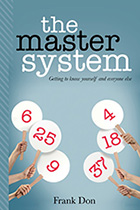I cannot conceal my concern for some difficult periods as we come towards the end of the Summer and especially in the mid-Autumn period. Hopefully, I am not expressing myself to the degree of Nouriel Roubini, professor of economics at my alma mater New York University Stern School of Business, who has sometimes been referred to as ‘Dr. Doom’.
Areas of concern for me, and areas of concern I would suggest you keep aware of, are related to the following:
1. Financial stability with the potential of a significant downturn in financial markets with the realization that the housing market and banking system problems may have been the tip of an iceberg, with other problems regarding global financial matters becoming ever more evident in a domino-theory type scenario. Could problems arise with increasing credit card defaults and commercial real estate? Please know that historically September and October can be very difficult months for the financial markets.
2. A sharp decline in the value of US dollar. Already we have heard the BRIC nations [Brazil, Russia, India and China] raise the question of the reliability of the US dollar as the world’s reserve currency and their suggestion of a different reserve currency. A shift away from the US dollar could further fuel devaluation of the US dollar.
3. Health issues. The WHO has already declared the H1N1 influenza virus a pandemic, raising the alert level as I write from a phase 5 alert to a phase 6 alert level. With people under stress from the changes occurring in our world at large and with the stress placed upon the immune system at the time of changing seasons, this Autumn period could see a spike up in concerns about influenza virus and it’s ability to metamorphize. It is essential that we develop a good health regimen, concentrate on our well-being and create programs to strengthen our immune system and a healthy attitude.
4. Geopolitical issues. There is a significant shift in energy as we come into the mid-Autumn period, a shift that can put significant pressure on relationships — relationships between countries, relationships in personal interactions. Toward the end of this year and over the next two years, we may see increased friction between countries with various pacts and trade agreements pitting some alliances against other alliances. We could also see a step up in domestic violence, as people unable to adapt and change with shifting conditions, vent their frustrations and anger on those closer to home.
5. Baton Passing. Like life itself, superpowers change. The 19th Century belonged to the British, the 20th Century to the US. I believe the 21st Century belongs to the Chinese. During the end of this Summer and into the Autumn, the baton passing may become increasingly evident. It does not have to occur with stretching the muscles of one’s military might. It can occur quietly, albeit swiftly, by means of economic muscle stretching. The Chinese have been pursuing various trade agreements with different countries, have been buying up foreign companies of natural resources, and hold a significant percentage of the US national debt. Recent economic crises have placed the Chinese in a potent bargaining position.
6. Although we have been going through a recent period of deflation, are we likely to see incipient signs of inflation as economies start to pick up with the help of governments’ stimulus plans? With the printing of money, increasing the money supply, could the volatility of these times flip from a deflationary cycle into a hyperinflationary cycle? As noted at the G20 summit in London in April, the German Chancellor Angela Merkel was less enthusiastic than her colleagues of national leaders for stimulus package after stimulus package. There is the wise saying that those who do not learn from history, are doomed to repeat it. Prior to the ascent of Hitler and the Second World War, Germany experienced a period when printing money became non-stop and the mark virtually worthless. Deflationary cycles were followed by inflationary cycles and the rest is history. Will we learn from history?
7. Could another wave of foreclosures dampen the sense of the housing market having bottomed and in process of turning around? To remember Yogi Berra’s words ‘that it ain’t over ’til it’s over’, the housing problem may not have been totally resolved and there could be further foreclosures and price decreases in some housing markets.
8. Unemployment figures. While our society is going through a major transformation, the question needs to be raised as to whether there will be the same level of demand for labor as in times past. If productivity is increasing, technology advancing and industries shifting, could these factors play to a lessened demand for labor? If unemployment continues to go up, what are the ramifications for the unemployed unable to meet their financial obligations and service their debt load?
9. Post-consumer society. What if some of the changes occurring happen to be changes on a fundamental structural level? What if we are moving away from being a consumer society, where in the US 70% of the GDP is the consumer, and moving instead to a post-consumer society? The implications would be strong for governmental agencies both in terms of revenue streams through taxation and in terms of the size of the economy.
10. Stimulus Packages. With a contraction in the economy, governmental agencies [federal, state, county, municipal] may be forced to find additional funding. And if the economy is slow to turn around, what other non-governmental agencies might seek federal assistance? We might wonder whether more bailouts are in the works.
I am NOT into doom and gloom, but I do believe that these times demand that we be AWARE and MINDFUL, look at circumstances and the various possibilities unfolding and not merely accept the spin or the consensus opinion of what appears to be going on. Once we are aware of the backdrop, even if we cannot be fully cognizant of the implications of the twists and turns of life unfolding, then we can make our choices and determine the best for our lives no matter what the backdrop of the external realities are around us.

